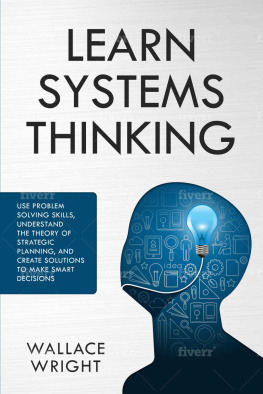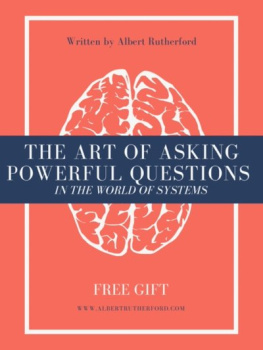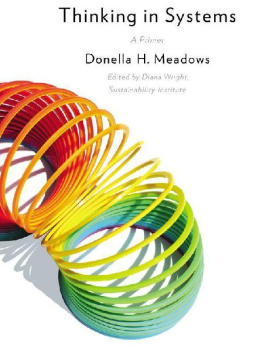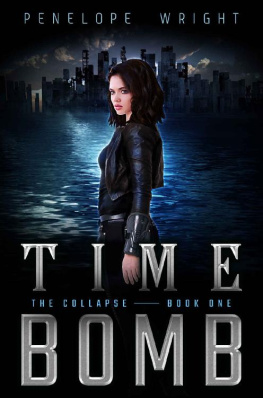Wright - Learn Systems Thinking
Here you can read online Wright - Learn Systems Thinking full text of the book (entire story) in english for free. Download pdf and epub, get meaning, cover and reviews about this ebook. year: 2019, genre: Romance novel. Description of the work, (preface) as well as reviews are available. Best literature library LitArk.com created for fans of good reading and offers a wide selection of genres:
Romance novel
Science fiction
Adventure
Detective
Science
History
Home and family
Prose
Art
Politics
Computer
Non-fiction
Religion
Business
Children
Humor
Choose a favorite category and find really read worthwhile books. Enjoy immersion in the world of imagination, feel the emotions of the characters or learn something new for yourself, make an fascinating discovery.
- Book:Learn Systems Thinking
- Author:
- Genre:
- Year:2019
- Rating:3 / 5
- Favourites:Add to favourites
- Your mark:
- 60
- 1
- 2
- 3
- 4
- 5
Learn Systems Thinking: summary, description and annotation
We offer to read an annotation, description, summary or preface (depends on what the author of the book "Learn Systems Thinking" wrote himself). If you haven't found the necessary information about the book — write in the comments, we will try to find it.
Learn Systems Thinking — read online for free the complete book (whole text) full work
Below is the text of the book, divided by pages. System saving the place of the last page read, allows you to conveniently read the book "Learn Systems Thinking" online for free, without having to search again every time where you left off. Put a bookmark, and you can go to the page where you finished reading at any time.
Font size:
Interval:
Bookmark:
Download the Audio Book Version of This Book for FREE
If you love listening to audio books on-the-go, I have great news for you. You can download the audio book version of this book for FREE just by signing up for a FREE 30-day audible trial! See below for more details!

Audible Trial Benefits
As an audible customer, you will receive the below benefits with your 30-day free trial:
- FREE audible book copy of this book
- After the trial, you will get 1 credit each month to use on any audiobook
- Your credits automatically roll over to the next month if you dont use them
- Choose from Audibles 200,000 + titles
- Listen anywhere with the Audible app across multiple devices
- Make easy, no-hassle exchanges of any audiobook you dont love
- Keep your audiobooks forever, even if you cancel your membership
- And much more
Click the links below to get started!
For Audible US
https://www.audible.com/pd/B07X3Y7933/?source_code=AUDFPWS0223189MWT-BK-ACX0-162575&ref=acx_bty_BK_ACX0_162575_rh_us
For Audible UK
https://www.audible.co.uk/pd/B07X4WKJGV/?source_code=AUKFrDlWS02231890H6-BK-ACX0-162575&ref=acx_bty_BK_ACX0_162575_rh_uk
For Audible FR
https://www.audible.fr/pd/B07X3Y7CT4/?source_code=FRAORWS022318903B-BK-ACX0-162575&ref=acx_bty_BK_ACX0_162575_rh_fr
For Audible DE
https://www.audible.de/pd/B07X51JQW9/?source_code=EKAORWS0223189009-BK-ACX0-162575&ref=acx_bty_BK_ACX0_162575_rh_de
Learn Systems Thinking:
Use Problem Solving Skills, Understand the Theory of Strategic Planning, and Create Solutions to Make Smart Decisions

Wallace Wright
Table of Contents
Copyright 2019 - All rights reserved .
This content is provided with the sole purpose of providing relevant information on a specific topic for which every reasonable effort has been made to ensure that it is both accurate and reasonable. Nevertheless, by purchasing this content you consent to the fact that the author, as well as the publisher, are in no way experts on the topics contained herein, regardless of any claims as such that may be made within. As such, any suggestions or recommendations that are made within are done so purely for entertainment value. It is recommended that you always consult a professional prior to undertaking any of the advice or techniques discussed within.
This is a legally binding declaration that is considered both valid and fair by both the Committee of Publishers Association and the American Bar Association and should be considered as legally binding within the United States.
The reproduction, transmission, and duplication of any of the content found herein, including any specific or extended information will be done as an illegal act regardless of the end form the information ultimately takes. This includes copied versions of the work physical, digital and audio unless express consent of the Publisher is provided beforehand. Any additional rights reserved.
Furthermore, the information that can be found within the pages described forthwith shall be considered both accurate and truthful when it comes to the recounting of facts. As such, any use, correct or incorrect, of the provided information will render the Publisher free of responsibility as to the actions taken outside of their direct purview. Regardless, there are zero scenarios where the original author or the Publisher can be deemed liable in any fashion for any damages or hardships that may result from any of the information discussed herein.
Additionally, the information in the following pages is intended only for informational purposes and should thus be thought of as universal. As befitting its nature, it is presented without assurance regarding its prolonged validity or interim quality. Trademarks that are mentioned are done without written consent and can in no way be considered an endorsement from the trademark holder.

Introduction
The challenges of the 21 st centuryfrom humanitarian to economic to environmentaldemand new ways of thinking and more complex, flexible ways of acting. We no longer live in a disconnected world, due to the advances in technology and travel; a globalized world and economy require different approaches. Systems thinking is a highly developed and influential way of looking at the myriad and complicated interactions between humans, institutions, and natural processes. This text is designed to help you understand what systems thinking is and to begin using it in problem-solving, strategic planning, and smart decision making.
With this dynamic new way of looking at the world and at organizations, you will be able to implement innovative and sustainable change. Systems thinking looks at the complex interactions between the parts of the system, rather than focusing on individual components in isolation. To use a real-world example: the internet does not exist as one static, stable thing that we can examine at one moment in time in order to understand it or use it effectively; rather, it is a complex system, with the various nodes on the network connecting and re-connecting at different moments in different ways. System thinking gives us the tools and models to begin thinking in recurring loops, not in flat lines.
Systems thinking encourages us to think in a three dimensional way and learning the terms and tools of this new approach to business, and the world can assist us in solving the complex problems that we face, as well as encourage us to plan well and make smarter decisions for our future.
PART I: Interconnectedness
This requires a different worldview than one we relied on for much of modern times, one that demands us things as cyclical rather than linear. Interconnectedness doesnt just refer to technologythough that is certainly a significant part of our daily lives that depends on an understanding of how parts relate to the wholebut also to how humans influence each other and any system of which they are apart.
Basically, we are dependent on each otherand our environment, our technology, our sciencefor survival. Just as each part of an ecosystem relies on every other part for its sustainability, so do we rely on all of the parts in our system to survive and function well? If one part of the system fails, then the system is damaged, irreparably until the part is fixed or the system adapts. Its not simply biological objects that make up a system, either: the inanimate objects that we require for a system to run smoothly are also a part. For example, a family is a system that requires many elements, institutions, and objects to run smoothly. This doesnt mean that there is only one family system that functionsthere are several models of different make-ups that work equally wellbut within whatever system you divine, all the parts must be up to the task or the family unit doesnt function as well. This is where either the part must be fixed, problems addressed, or the system must adapt to whatever new configuration presents itself.
This kind of thinking is fundamentally different from the old world view of mechanistic, linear thinking, wherein a top-down authority controlled the other moving parts. This kind of thinking produced systems that have now broken down all over the world, most notably in governmental organizations: the feudal lord in his castle, hiring the knights for defense, and forcing the serfs to work the land no longer works. Interconnectedness suggests that the system works better when each part provides support for every other part, and each part is able to produce valuable feedback. This kind of communication must be multi-directional and contingent upon relationships. This kind of thinking understands that even the smallest part of a system deserves consideration, and it is fundamentally more equality-based democratic view of how the world works.
Next pageFont size:
Interval:
Bookmark:
Similar books «Learn Systems Thinking»
Look at similar books to Learn Systems Thinking. We have selected literature similar in name and meaning in the hope of providing readers with more options to find new, interesting, not yet read works.
Discussion, reviews of the book Learn Systems Thinking and just readers' own opinions. Leave your comments, write what you think about the work, its meaning or the main characters. Specify what exactly you liked and what you didn't like, and why you think so.
















